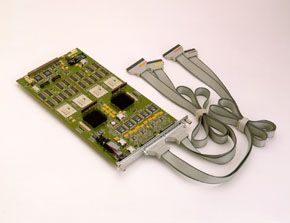Agilent / HP / Keysight 16750A
16750A 400 MHz State, 2 GHz Timing, 68 Channel Logic Analyzer Module with 4M Memory
Description
The Agilent 16750A logic analyzer is suitable for general purpose hardware debug and 8/16 bit processor debug. Just configure the 16750A module as two independent state analyzers that sample data using separate clocks. Then, view both time-correlated state listings together on the same screen.
The 16750A logic analyzer is designed in such a way that the user can spend more time making measurements and less time setting up the 16750A logic analyzer even if it may not be used everyday.
Memory depth can be an invaluable resource when trying to link the symptom of a problem to its root cause. Extensive acquisition memory of the 16750A allows you to view long periods of code execution, capture deep traces of timing information, optimize your system for peak performance, or validate your ASIC design against EDA simulations.
The 16750A logic analyzer memory system is similar to a circular buffer. When the acquisition is started, the analyzer continuously acquires data samples and stores them in memory.
When memory becomes full, the 16750A simply wraps around and stores each new sample in the place of the sample that has been in memory the longest. This process will continue until the logic analyzer finds the trigger point.
The 16750A logic analyzer trigger stops the acquisition at the point user specify and provides a view into the system under test. The primary responsibility of the trigger is to stop the acquisition, but it can also be used to control the selective storage of data. Consider a logic analyzer with the trigger resources you need to quickly set up your measurements.
High input impedance will minimize the effect of probing on circuit. Although many probes are acceptable for lower frequencies, probing effects become very significant at higher frequencies.
EMF noise is everywhere, and it can corrupt the data. Active attenuator probing can be particularly susceptible to noise effects. Agilent Technologies designs probing solutions with high immunity to transient noise.
A flimsy probe gives you unintended open circuits, adding one more variable to the debugging equation. Agilent Technologies’ probes are mechanically designed to relieve strain and ensure a rugged and reliable connection.
A multitude of probing packages exist in the digital electronics industry. Check the large selection of probing solutions designed for specific chip packages or buses. As an alternative, Agilent offers reliable termination adapters that work with standard on-target connectors.
The Agilent 16750A Analyzer module offers industry standard state and timing analysis features at an affordable price.
Key Points
Verify the timing of critical edges with 250ps resolution across up to 40 channels, or 500ps resolution across up to 80 channels
Use the 1GSa/s synchronous state analysis to view high-speed data streams across up to 80 channels
The 250ps resolution of this analyzer and phase-locked loops, keeps the skew between channels to ± 250ps
The 250ps precision (channel-to-channel skew) allows this logic analyzer to be used in place of an oscilloscope for characterization
The high channel count of a logic analyzer makes this a much more efficient process
Timing Zoom function
Usable Deep memory
Hardware Accelerated Search
Fast waveform draw
Fast binary out
Constant feedback with cancel
Immunity to noise
Rugged and reliable connectivity
State and timing analysis through the same probe
Specifications
Memory Depth: 4M
Number of channels Per Module: 68
State Speed/Timing Speed: 400MHz to 2GHz
State/Timing Memory Depth: 4Mb
Type: Module
Number of state clocks/qualifiers: 4
Input resistance: 100 K Ohms, ±2%
Input Capacitance: 8pF
Parasitic tip capacitance: 1.5 pF
Minimum voltage swing: 500 mV, peak-to-peak
Threshold accuracy: ±(65 mV + 3% of threshold setting)
Maximum input overdrive: 250 mV
Operating Temperature: 0°C to 50°C
Humidity: 80% relative humidity at +40° C







